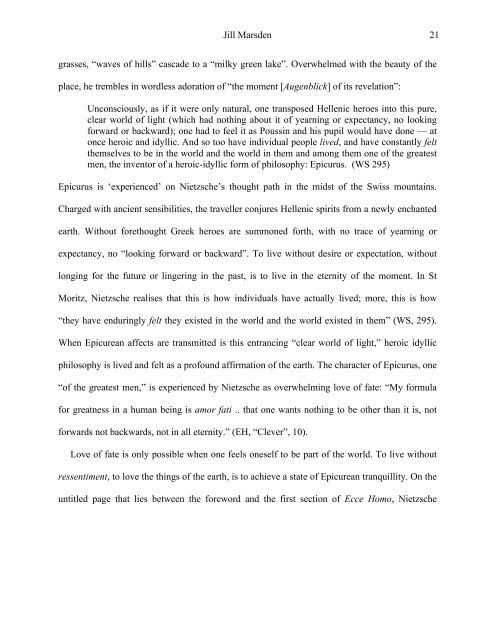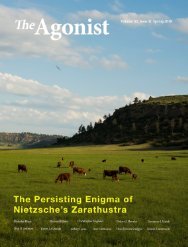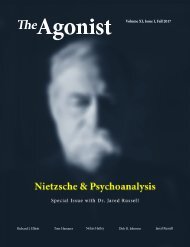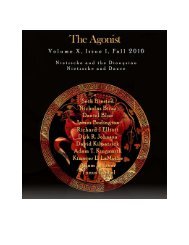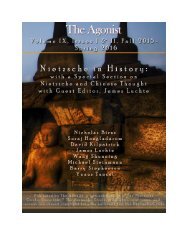Volume X, Issue II, Spring 2017
Agonist Issue: Volume X, Issue II, Spring 2017
Agonist Issue: Volume X, Issue II, Spring 2017
Create successful ePaper yourself
Turn your PDF publications into a flip-book with our unique Google optimized e-Paper software.
Jill Marsden 21<br />
grasses, “waves of hills” cascade to a “milky green lake”. Overwhelmed with the beauty of the<br />
place, he trembles in wordless adoration of “the moment [Augenblick] of its revelation”:<br />
Unconsciously, as if it were only natural, one transposed Hellenic heroes into this pure,<br />
clear world of light (which had nothing about it of yearning or expectancy, no looking<br />
forward or backward); one had to feel it as Poussin and his pupil would have done — at<br />
once heroic and idyllic. And so too have individual people lived, and have constantly felt<br />
themselves to be in the world and the world in them and among them one of the greatest<br />
men, the inventor of a heroic-idyllic form of philosophy: Epicurus. (WS 295)<br />
Epicurus is ‘experienced’ on Nietzsche’s thought path in the midst of the Swiss mountains.<br />
Charged with ancient sensibilities, the traveller conjures Hellenic spirits from a newly enchanted<br />
earth. Without forethought Greek heroes are summoned forth, with no trace of yearning or<br />
expectancy, no “looking forward or backward”. To live without desire or expectation, without<br />
longing for the future or lingering in the past, is to live in the eternity of the moment. In St<br />
Moritz, Nietzsche realises that this is how individuals have actually lived; more, this is how<br />
“they have enduringly felt they existed in the world and the world existed in them” (WS, 295).<br />
When Epicurean affects are transmitted is this entrancing “clear world of light,” heroic idyllic<br />
philosophy is lived and felt as a profound affirmation of the earth. The character of Epicurus, one<br />
“of the greatest men,” is experienced by Nietzsche as overwhelming love of fate: “My formula<br />
for greatness in a human being is amor fati .. that one wants nothing to be other than it is, not<br />
forwards not backwards, not in all eternity.” (EH, “Clever”, 10).<br />
Love of fate is only possible when one feels oneself to be part of the world. To live without<br />
ressentiment, to love the things of the earth, is to achieve a state of Epicurean tranquillity. On the<br />
untitled page that lies between the foreword and the first section of Ecce Homo, Nietzsche


